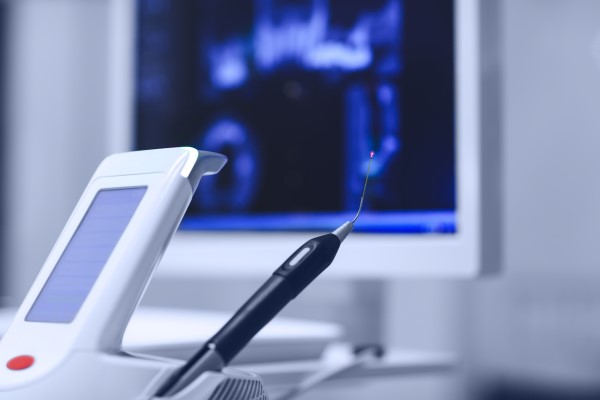Laser Dentistry: Three Common General Dentistry Uses

Laser dentistry was first used in the early 1960s and has continued to gain popularity since then. The interesting part of dental lasers is that they are not single-use only – lasers are applicable in multiple areas of dentistry, from diagnosis to treatment. In the last few years, there has been a significant amount of research, innovation and development to make the latest laser systems more portable, effective and efficient for regular use in general dentistry practices.
The application of lasers in general dentistry
Every laser functions by emitting targeted light as energy sources. For dental procedures, lasers work as a cutting device or vaporizer for tissues it touches. The type of lasers commonly used in dentistry are diode lasers. The major reason is their compact size, portability, reduced cost and versatility for many dental treatments. Diode lasers were first used in dentistry in the 1990s.
When laser dentistry is applied for teeth whitening treatments, the laser provides the heat source to boost the effectiveness of the agent used for the bleaching process. Some of the other uses of laser dentistry include:
Detection and repair of cavities
Before patients start noticing the signs of a cavity on their teeth, it may have been developing. Early detection of cavities on the teeth makes them easier to treat. Therefore, the dentist may use a low-intensity laser to lighten up the tooth to make detecting a developing cavity easier before it worsens. The most commonly used lasers are those that replace dental drills. If a cavity requires repair, the dentist can use the laser to reshape the tooth instead of the drill. The benefit of this is a much more comfortable dental treatment with minimal vibration and noise.
Reshape the gums
Gum reshaping, otherwise called a gum lift, may be recommended for cosmetic or medical purposes. Another major benefit of lasers in dentistry is that they remove the need for scalpels. Instead of making incisions and cutting the gums, dentists can use high precision lasers to dissolve the gum tissue. Since it cauterizes without cutting, shaping and removing gum tissues with lasers is usually more comfortable with minimal bleeding and faster recovery times.
Treatment of gum disease
One of the major indications of advanced gum disease, called periodontitis, is the development of deep pockets between the gums and the teeth. One of the treatment options the dentist will recommend is scaling and root planing, which entails cleaning the pockets and smoothing the roots to allow the gums to reattach to them. The use of lasers for this process has been shown to increase reattachment and reduce discomfort during treatment.
In conclusion
The above are only a few applications of lasers in general dentistry. The general dentist may use lasers to remove a biopsy (small tissue piece) for an oral cancer examination. There are other applications, including removal of lesions in the mouth, relieving the pain of canker sores, disinfection and 3D oral scans. Generally, laser dentistry makes dental procedures more comfortable and increases the effectiveness of most dental treatments.
Request an appointment here: https://www.aboutdentalcare.com or call About Dental Care at (435) 359-0147 for an appointment in our St. George office.
Check out what others are saying about our dental services on Yelp: Laser Dentistry in St. George, UT.
Recent Posts
Curious about laser dentistry? Read on to learn more about this type of treatment. Medical professionals may modify or remove tiny quantities of tissue using lasers. While laser surgery has numerous applications outside of dentistry, the vast majority of patients had never ever heard of laser dentistry until they needed it. Dentists employ lasers for…
Correcting mouth issues with a beam of light might sound like science-fiction, but laser dentistry is a present, common, and effective practice. Dental lasers are less noisy and less invasive than traditional drills. They often cause less anxiety and fear during dental procedures and reduce healing times and pain as well. With all this in…
The use of laser dentistry to treat a variety of dental issues has been commercially available since 1989. Lasers are a less painful and more efficient option than the drills and tools used in traditional dental treatment procedures. Many patients also feel more comfortable with the sounds and feel of laser treatment. Laser treatment options…
Laser dentistry is a relatively young concept that can target diseased soft tissue and improve the health of gums, jawbone, and more. Dental lasers are approved by the Food and Drug Administration (FDA), and the risks of the procedure are minimal. Subsequently, dentists often recommend laser dentistry for deep dental cleaning procedures. A routine dental cleaning…


